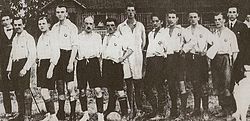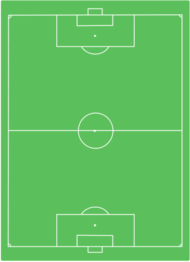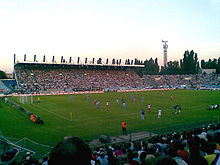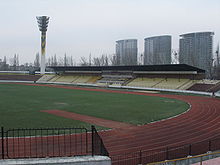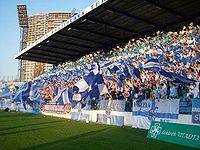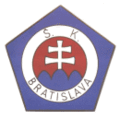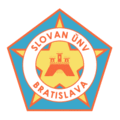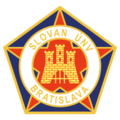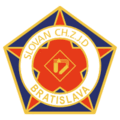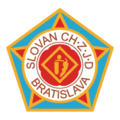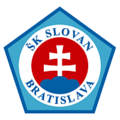- ŠK Slovan Bratislava
-
This article is about the Slovan football club. For the ice hockey club, see HC Slovan Bratislava.
Slovan Bratislava 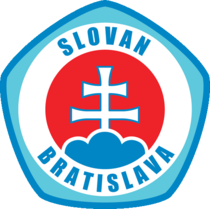
Full name ŠK Slovan Bratislava Bratislava futbal, a.s. Nickname(s) Belasí (Sky blues)
Jastrabi z Tehelného poľa (The Hawks from Brick Field)Founded 3 May 1919
as 1. ČsŠK BratislavaGround Pasienky, Bratislava
(Capacity: 13,000[1])Chairman Ivan Kmotrík Manager Vladimír Weiss League Corgoň Liga 2010–11 Corgoň Liga, 1st Website Club home page Home coloursAway coloursThird coloursŠK Slovan Bratislava is a football club based in Bratislava, Slovakia, that plays in the Corgoň liga. Founded as 1. ČsŠK Bratislava in 1919, the club changed its name to Slovan Bratislava in 1953. Slovan is the most successful team in Slovakia with the richest and the most famous tradition created during the ninety two years of its existence.
With purposive and concentraced work, it gained the most primaces in Slovak football. The first and till now only club in Slovakia as well as former Czechoslovakia, it won one of the European cup competitions, in the year 1969 the Cup Winners' Cup when it defeated FC Barcelona in the final match in Basel. It has already played in all three European cup competitions. Slovan Bratislava has forever entered the history of football by other successes as well. When in the year 1976 Czechoslovakia became the European champion in the Belgrade final, it was mainly thanks to seven Slovan players.
The biggest personalities of Slovak football, who played under flags of FIFA and UEFA in the all-star teams of Europe and the world, also wore the jersey of Slovan. The most of representatives of former Czechoslovakia as well as Slovakia has till now come from this football club. Slovan Bratislava is a term closely connected with top football in Slovakia.
Contents
History
Early years
Slovan was founded on 1 April 1919 in the Panonia Café in Bratislava, as I.ČsŠK Bratislava. The first president was Police Captain Richard Brunner, who arranged the club's first temporary training ground at Kuchajda (Pasienky). The club soon moved to Petržalka.
I.ČsŠK became the champions of Slovakia in 1922. Notable players from the early era were Pavol Šoral, Štefan Čambal and Štefan Priboj. In the spring of 1938 anti-Jewish sentiments penetrated into the club, and the victim was coach József Braun, who was one of the many Bratislavčanov who had to involuntarily leave the city. Under the terms of the Munich agreement of 1939 Czechoslovakia was dissolved, leading to the emergence of the Slovak Republic. At this point the club name was changed to ŠK Bratislava. On 26 September 1940 ŠK Bratislava played its first game at the new stadium, Tehelné pole.
The first international meeting at the new venue was on 27 October 1940, when ŠK Bratislava and Hertha Berlin played to a 2–2 draw. In the separate Slovakian league, ŠK Bratislava won the title four times in the period from 1939 to 1945. Slovan was the first Czechoslovak team to use the WM formation. The team's first foreign opponent after World War II was Ferencvárosi TC. ŠK Bratislava lost 0–1, but won the Central European Cup 2–1 over Hungary before 20,000 spectators at Tehelnom field. In this period former players of I. ČsŠK Bratislava Ferdinand Daučík and Leopold "Jim" Šťastný served as coaches for ŠK Bratislava.
Czechoslovak league
The team name changed again in 1948, to Sokol NV Bratislava. The team met with success in 1949, when they became the first champions of the newly-formed country of Czechoslovakia. Outstanding players from this era included Emil Pažický, Gejza Šimanský, Bozhin Laskov, Viktor Tegelhoff, and Teodor Reimann.
Anton Bulla, the coach in 1953, added eight new players to team. In 1961–1962 the team defeated Red Star Bratislava in the national league for the title. Under the influence of political and economic pressures and interests, TJ ÚNV Slovan and TJ Dimitrov merged to create CHZJD Slovan Bratislava on 5 August 1961.
1962 was a successful year, as Czechoslovak representatives were defeated in the finals 3–1 by Brazil at the World Cup in Chile, obtaining the silver, and repeating the success of the 1934 FIFA World Cup Final in Rome. Slovan players included goalkeeper Viliam Schrojf and defender Ján Popluhár.
1969 European Cup Winners' Cup Final starting lineup. Slovan ended the 1967–68 season second in the league, won the cup in Czechoslovakia, and participated in the UEFA Cup Winners Cup. The team was managed by former Slovan player Michal Vičan, who focused on fast and simple games. Vičan took the team on a winter tour of Argentina in 1969.
UEFA Cup Winners' Cup trophy
On 21 May 1969 the team defeated FC Barcelona in the 1969 European Cup Winners' Cup Final by a score of 3–2. Some of the players on the team were Ľudovít Cvetler, Vladimír Hrivnák, Ján Čapkovič, Karol Jokl, Alexander Horváth, Jozef Čapkovič, and Alexander Vencel.
In 1970 the Czechoslovakian team sent to the FIFA World Cup in Mexico included seven players from Slovan: Alexander Vencel, Ján Zlocha, Ivan Hrdlička, Karol Jokl, Ján Čapkovič, Vladimír Hrivnák, and Alexander Horváth. Jozef Vengloš was the coach of the Slovan Bratislava team for part of this era, as well as performing duties coaching at the international level.
In 1976 a Czechoslovakian team consisting mainly of Slovan players won the European title in the European Championships held in Belgrade. Gold medals were given to coach Vengloš, Alexander Vencel, Jozef Čapkovič, Koloman Gogh, Marián Masný, Anton Ondruš, Ján Pivarník, and Ján Švehlík. From the 1977/78 season Slovan was declining. In the 1984/85 season Slovan, led by coaches Ján Hucko and Jozef Obert, left the highest level of competition and were placed in the Slovakian National League.
After three seasons spent in the Slovakian National League, Slovan Bratislava be able to return to national competition. In season 1987/88 the team returned to the top leagues under the leadership of coaches Ján Zachar and Jozef Jankech, who later coached the Slovak national team. Dušan Galis was the coach from 1977–1981. In 1992 Slovan Bratislava won the last Czechoslovak title. Among the stars on the team were Peter Dubovský, Dušan Tittel, Ladislav Pecko, Vladimir Kinder, Miloš Glonek, Tomáš Stúpala, and Alexander Vencel. Peter Dubovský played for the club from 1989–1993.
Slovak league
Slovan won titles in the Slovak league in the 1993/94, 1994/95 and 1995/96 seasons. The next two years, they won in the premier league, MFK Košice. Slovan returned to the Slovak throne in the 1998/99 season. The stars of the team included coach Stanislav Griga and players Róbert Tomaschek, Miroslav König, Stanislav Varga, Tibor Jančula, and Ladislav Pecko. In the net few years the club's performance was below par and they were in trouble financially. They were forced to sell some of their best players. At the end of the 2003/04 season, the team was relegated to a lesser league, where they spent two seasons. After two years, in the 2010/11 season Slovan won double with coach Karel Jarolím.
Stadiums
Main articles: Tehelné pole and Štadión PasienkyTehelné pole has a capacity of 30,085 spectators,[2] and is 105 m long and 68 m wide.[3]
The stadium was built during the first Slovak Republic, when Nazi Germany occupied Petržalka in 1938 and Bratislava lost almost all of its sporting facilities.[4] The construction lasted from 1939 to 1944 and the stadium became home ground for Slovan Bratislava. The stadium was officially opened in September 1940 with 25,000 places, and the first international match was played on 27 October 1940, with Slovan Bratislava playing against Hertha Berlin, ending in 2–2 tie. The old stadium underwent reconstruction in 1961, which added second tribune, boosting its capacity to 45,000 and modernising by adding score table, artificial light and revamping the field.[5] However, the stadium could hold up even 50,000 spectators, and just before breakup of Czechoslovakia, it was the largest one in use (Strahov Stadium in Prague had a capacity of 220,000 but was disused in the 1990s) and was the home ground for Czechoslovak national team.[6]
The stadium was reconstructed once more in the 1990s to the "all-seater" stadium, reducing the capacity into 30,000.[6] After this, the Tehelné pole stadium was the second-largest in Slovakia after Všešportový areál in Košice, however, that stadium is now disused. In 2005–06, it was also used as the "home" ground for FC Artmedia Bratislava in that club's Champions League and UEFA Cup campaigns, as Artmedia's own ground did not meet minimum standards for UEFA competition. It is planned that the current stadium will be demolished and a new one with the capacity around 35,000 people will be built, costing around 80 million Euro.[7] The need for a new stadium stems from the UEFA rules, which require to play international matches on stadiums of certain standards from 2008, however, Slovakia lacks these stadiums so far.[7]
In July 2009 Slovak government decided to support the construction of new stadium. The demolition works are planned for March–April 2010 and the new stadium should be opened in May 2012. Its capacity will be 22,000 spectators with possibility of enlargement to 30,000.[8]Today, Slovan home ground is Pasienky. Štadión Pasienky is a multi-purpose stadium in Bratislava, Slovakia. The stadium holds 13,295 people.
Supporters and rivalries
The fans are well-known throughout the country for their passion. The main ultras groups are called Belasá šlachta and Ultras Slovan. They travel to most away games, and always in large numbers against club rival Spartak Trnava.
Slovan's major rival teams in Bratislava are Inter Bratislava and MFK Petržalka. The battle between Slovan and Inter has a long and rich history: both teams played in the Czechoslovak league. Rivalry with Petržalka peaked after 2000. The biggest opponent of Slovan Bratislava is Spartak Trnava. Duels between these teams are most prestigious matches in Slovakia.
Historical names
- 1. ČsŠK Bratislava (1919–39)
- ŠK Bratislava (1939–48)
- Sokol NV Bratislava (1948–53)
- ÚNV Slovan Bratislava (1953–61)
- Slovan CHZJD Bratislava (1961–90)
- ŠK Slovan Bratislava (1990–present)
Crest
Honours
Domestic
- Corgoň liga (1993–)
- Winners (6): 1993–94, 1994–95, 1995–96, 1998–99, 2008–09, 2010–11
- Slovak League (1939–44)
- Winners (4): 1940, 1941, 1942, 1944
- Slovak Cup
- Winners (12): 1969–70, 1971–72, 1973–74, 1975–76, 1981–82, 1982–83, 1988–89, 1993–94, 1996–97, 1998–99, 2009–10, 2010–11
- Slovak Super Cup (Pribina Cup)
- Winners (4): 1993, 1994, 1996, 2009
- Czechoslovak First League (1925–93)
- Czechoslovak Cup (1961–93)
- Winners (5): 1961–62, 1962–63, 1967–68, 1973–74, 1981–82
- Czechoslovak Amateur League
- Winners (2): 1927, 1930
European
- UEFA Cup Winners' Cup
- Winners (1): 1968–69
- Intertoto Cup
- Winners (10): 1968, 1970, 1972, 1973, 1974, 1977, 1990, 1992, 1993, 1994
- Ciutat de Barcelona Trophy
- Winners (1): 1974
- Ciudad de Cartagena Trophy
- Winners (1): 1996
Players
Current squad
As of 14 October 2011
Note: Flags indicate national team as has been defined under FIFA eligibility rules. Players may hold more than one non-FIFA nationality.No. Position Player 1 
GK Peter Bartalský 3 
MF Radoslav Augustín 4 
DF Erik Čikoš 5 
MF Zé Vitor (on loan from São Paulo) 6 
DF Martin Dobrotka 8 
MF Erik Grendel 9 
FW Juraj Halenár 10 
MF Igor Žofčák (captain) 11 
MF Marko Milinković 12 
MF Adrián Čermák 14 
FW Marek Kuzma 16 
FW Lukáš Hartig (on loan from Bohemians 1905) 17 
MF Jiří Kladrubský 18 
DF Mamadou Bagayoko No. Position Player 19 
MF Karim Guédé 20 
FW Krešimir Kordić 21 
MF Peter Štepanovský 22 
GK Peter Gábriš 23 
DF Kristián Kolčák 25 
DF Lukáš Pauschek 26 
MF Juraj Kuráň 28 
DF Marián Had 29 
DF Radek Dosoudil 30 
GK Matúš Putnocký 31 
FW Miloš Lačný (on loan from Sparta Prague) 32 
FW Ivo Táborský (on loan from Mladá Boleslav) 33 
FW Filip Šebo 39 
GK Lukáš Hroššo (on loan from Nitra) Out on loan
Note: Flags indicate national team as has been defined under FIFA eligibility rules. Players may hold more than one non-FIFA nationality.
No. Position Player 
MF Filip Kiss (at Cardiff City F.C.) 
FW Boris Turčák (at ŠK SFM Senec) 27 
FW Ákos Szarka (at ŠK SFM Senec) 
FW Lukáš Hutta (at FC Petržalka 1898) Staff
Position Staff Head Coach  Vladimír Weiss
Vladimír WeissAssistant Coach  Tibor Mičinec
Tibor MičinecAssistant Coach  Jozef Kontír
Jozef KontírGoalkeepers Coach  Miroslav König
Miroslav KönigDoctor  Ladislav Pavlovič
Ladislav PavlovičDoctor  Ján Grňa
Ján GrňaPhysiotherapist  Jiří Jurza
Jiří JurzaPhysiotherapist  Viliam Kalman
Viliam KalmanMasseur  Štefan Szilágyi
Štefan SzilágyiCustodian  Ján Beniak
Ján BeniakSource:[citation needed]
Club officials
- Chairman: Ivan Kmotrík
- Members of Directorate: Ivan Kmotrík Jr. and Gabriel Herbrík
- General Director: Dušan Tittel
- Sport Director: Ján Švehlík
- Technical Director: Zdeno Roman
- Director for Communication: Martin Urmanič
- Marketing Manager: Ján Kulhánek
- B-team coach: Samuel Slovák
Reserve team
Main article: ŠK Slovan Bratislava BReferences
- ^ http://www.uefa.com/MultimediaFiles/Download/StatDoc/competitions/-Publications/01/67/58/96/1675896_DOWNLOAD.pdf
- ^ Football stadiums of the world – Stadium List Europe
- ^ O Slovane – Slovan Bratislava – Futbalový klub
- ^ Lacika, "Bratislava", p. 195 (Slovak)
- ^ História Slovana – Slovan Bratislava – Futbalový klub
- ^ a b Tehelne pole nahradi narodni stadion – Reprezentace – Fotbal – Sportplus – Aktualne – Aktualne.cz
- ^ a b "State to finance Sk3 billion football stadium". The Slovak Spectator. http://www.spectator.sk/articles/view/23624.
- ^ "Moderný NFŠ na Tehelnom poli s kapacitou 22 000 miest". Futbalsfz.sk. 21. júla 2009. http://www.futbalsfz.sk/uvod/modern-nf-na-tehelnom-poli-s-kapacitou-22-000-miest-1199/.
External links
- Slovan Bratislava official website (Slovak)
- Belasá šlachta website (Slovak)
- Ultras Slovan website (Slovak)
Rivalries Related articles 1969 European Cup Winners' Cup Final2011–12 UEFA Champions League Currently playing in the
group stageGroup A: Bayern Munich · Manchester City · Napoli · Villarreal
Group B: CSKA Moscow · Internazionale · Lille · Trabzonspor
Group C: Basel · Benfica · Manchester United · Oțelul Galați
Group D: Ajax · Dinamo Zagreb · Lyon · Real Madrid
Group E: Bayer Leverkusen · Chelsea · Genk · Valencia
Group F: Arsenal · Borussia Dortmund · Marseille · Olympiacos
Group G: APOEL · Porto · Shakhtar Donetsk · Zenit St. Petersburg
Group H: BATE Borisov · Barcelona · Milan · Viktoria PlzeňEliminated in the
play-off roundChampions: Copenhagen · Maccabi Haifa · Malmö FF · Sturm Graz · Wisła Kraków
Non-champions: Odense · Rubin Kazan · Twente · Udinese · ZürichEliminated in the
third qualifying roundChampions: Ekranas · HJK Helsinki · Litex Lovech · Maribor · Partizan · Rangers · Rosenborg · Shamrock Rovers · Slovan Bratislava · Zestafoni
Non-champions: Dynamo Kyiv · Panathinaikos · Standard Liège · VasluiEliminated in the
second qualifying roundBangor City · Breiðablik · Borac Banja Luka · Dacia Chişinău · F91 Dudelange · HB Tórshavn · Linfield · Mogren · Neftchi Baku · Pyunik · Skënderbeu Korçë · Škendija · Skonto · Tobol Kostanay · Valletta · VideotonEliminated in the
first qualifying roundFC Santa Coloma · Tre FioriRound and draw dates · Qualifying phase and play-off round · Group stage · Knockout phase · FinalDunajská Streda · Dukla Banská Bystrica · Senica · Košice · Nitra · Ružomberok · Slovan Bratislava · Spartak Trnava · Tatran Prešov · Trenčín · Zlaté Moravce · ŽilinaCategories:- ŠK Slovan Bratislava
- Slovak football clubs
- Sport in Bratislava
- Sports clubs established in 1919
Wikimedia Foundation. 2010.

